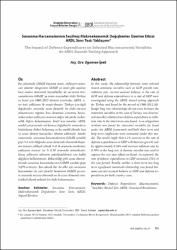| dc.contributor.author | İpek, Egemen | |
| dc.date.accessioned | 2015-02-19T09:44:59Z | |
| dc.date.available | 2015-02-19T09:44:59Z | |
| dc.date.issued | 2014 | |
| dc.identifier.issn | 13030876 | |
| dc.identifier.uri | https://hdl.handle.net/11421/1465 | |
| dc.description.abstract | Bu çalışmada GSMH büyüme oranı, enflasyon oranı, cari işlemler dengesinin GSMH’ ye oranı gibi seçilmiş bazı makro ekonomik büyüklükler ile savunma harcamalarının GSMH’ ye oranı arasındaki ilişki Türkiye ve İsrail için 1980-2012 dönemi üzerinden ARDL sınır testi yaklaşımı ile araştırılmıştır. Türkiye için ilgili değişkenler arasında uzun dönemli bir ilişki mevcut olmamasına rağmen kısa dönemde savunma harcamalarından enflasyon oranına doğru tek yönlü nedensellik ilişkisi bulunmuştur. İsrail için kurulan ARDL modeli çerçevesinde söz konusu değişkenler arasında eş bütünleşme ilişkisi bulunmuş ve bu model altında kısa ve uzun dönem katsayıları tahmin edilmiştir. Analiz sonucunda, savunma harcamalarının GSMH içindeki payı %1 artırıldığında uzun dönemde ekonomik büyüme oranını yaklaşık olarak % 0.36 oranında azalırken, enflasyon oranını ise % 0.30 oranında artmaktadır. Savaş yıllarının etkisinin yakalanabilmesi için kukla değişken kullanılmıştır. Beklenildiği gibi savaş dönemlerinde savunma harcamalarının GSMH içindeki payı %270 artmıştır. Son olarak her iki ülke için savunma harcamaları ile cari işlemler hesabının GSMH’ye oranı arasında ne kısa dönemde ne de uzun dönemde istatistiksel olarak anlamlı bir ilişki bulunmuştur. | en_US |
| dc.description.abstract | In this study, the relationship between some selected macro economic variables such as GDP growth rate, inflation rate, current account balance in the rate of GDP and defense expenditures as a rate of GDP were investigated using the ARDL bound testing approach for Turkey and Israel for the period of 1980-2012.Although long run relationships do not exist between the interested variables in the case of Turkey, uni-directional causality relation from defense expenditure to inflation rate in the short term was found. A co-integration relation was found for interested variables for Israel under the ARDL framework and both short term and long term coefficients were estimated under this model. The results imply that a 1% increase in the rate of defense expenditures in GDP will decrease growth rate by approximately 0.36% and increase inflation rate by 0.30% in the long run. A dummy variable was used to capture the war year effects on Israel. As expected, the rate of defense expenditures in GDP increased 270% in the war period. Finally, neither a short term nor long term significant statistical relationship was found between current account balance in GDP and defense expenditures for both country cases. | en_US |
| dc.language.iso | tur | en_US |
| dc.publisher | Anadolu Üniversitesi | en_US |
| dc.rights | info:eu-repo/semantics/openAccess | en_US |
| dc.subject | Savunma Harcamaları | en_US |
| dc.subject | Makroekonomik Değişkenler | en_US |
| dc.subject | Sınır Testi | en_US |
| dc.subject | ARDL | en_US |
| dc.subject | Yapısal Kırılma | en_US |
| dc.subject | Defence Expenditure | en_US |
| dc.subject | Macroeconomic Variables | en_US |
| dc.subject | Bound Test | en_US |
| dc.subject | ARDL | en_US |
| dc.subject | Structural Breakdown | en_US |
| dc.title | Savunma Harcamalarının Seçilmiş Makroekonomik Değişkenler Üzerine Etkisi: ARDL Sınır Testi Yaklaşımı | en_US |
| dc.title.alternative | The Impact of Defence Expenditures on Selected Macroeconomic Variables: An ARDL Bounds Testing Approach | en_US |
| dc.type | article | en_US |
| dc.relation.journal | Anadolu Üniversitesi Sosyal Bilimler Dergisi | en_US |
| dc.relation.publicationcategory | Makale - Ulusal Hakemli Dergi - Kategorisiz | en_US |


















